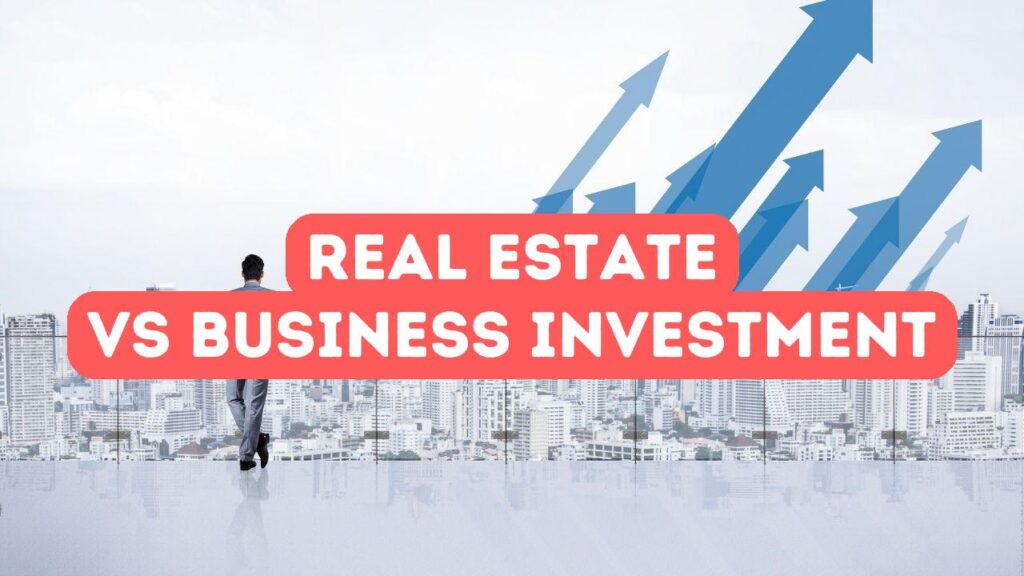Exploring the avenues of real estate investment and business investment often feels like standing at a crossroads, each path promising different fruits. When comparing these best investment options, one must weigh potential profits against risks. Real estate investment offers stability—an anchor in an uncertain sea—providing passive income and potential appreciation over time. On the flip side, a business investment could catapult you into the fast lane, with the chance for innovation and higher returns. But it’s not without its hurdles. Real estate vs business? It’s a question of your financial goals and risk tolerance. Consider: where do you see your money working hardest? Delve into these options, and you’ll find that the strategy you choose today might just pave the road to tomorrow’s success. So, are you ready to compare investments and choose your path to financial growth?
Evaluating the Long-Term Returns of Real Estate Investments
When evaluating real estate investment for long-term returns, it’s clear this avenue often stands as a beacon of stability amidst volatile markets. Think of it as planting a tree today to reap a shady retreat tomorrow. Real estate, with its unique charm, provides not only the promise of passive income through rentals but the likelihood of property value appreciation over time. The key is understanding market dynamics—when prices make sense, potential profits can be substantial. While some may argue stocks or a business investment might yield quicker returns, real estate’s enduring nature is its steadfast appeal. It’s about laying a solid foundation and watching your wealth grow brick by brick. So, as we compare investments, remember that the strength of property investments often lies in patience and vision, making real estate among the best investment options for those eyeing future financial security.
Diversifying through real estate investment means embracing both security and opportunity. Imagine owning a series of solid assets—each property offering a piece of the pie in terms of rental income and market appreciation. This isn’t just about collecting rent; it’s about crafting a portfolio that steadily appreciates, cushioning against inflation and economic shifts. In the real estate vs business debate, real estate often appeals to the risk-averse with its tangible assets. Yet, the most successful investors compare investments not only on current market conditions but with foresight—identifying trends and hotspots before others catch on. The best investment options often lie hidden within such insights. Real estate investment, with its adaptability and resilience, is like a fine wine—improving and maturing as time passes, offering a timeless strategy to cultivate wealth and legacy for generations to come.
In assessing real estate investment for long-term gains, you’re essentially planting seeds for future prosperity. Consider it as stewarding an orchard; each property you nurture today potentially becomes tomorrow’s bountiful harvest. The process is straightforward: analyze markets, pinpoint regions on the brink of growth, and let your assets do the work. Unlike the rapid climb of business investment, where the skies and storms are unpredictable, real estate provides a steady, slower ascent. But don’t be deceived by its calm—it often masks robust potential, ranking high among the best investment options. To truly compare investments, look at the bigger picture: real estate investment offers tax advantages, leverage opportunities, and a hedge against inflation. This isn’t a mere financial endeavor; it’s a passage toward a lasting legacy. So, next time you weigh real estate vs business, remember that patience, informed decisions, and resilience could turn bricks into lifelong dividends.
Navigating the Risks: Business Ventures vs. Property Ownership
Navigating the risks in both business ventures and property ownership requires a sharp eye and an iron gut. Business investment may entice you with tales of skyrocketing returns, but it’s a high-wire act, teetering over a deep chasm of market fluctuations and competitive pressures. Real estate investment, conversely, often feels like a sturdy fortress, offering more predictable returns and a tangible asset you can see and touch. Yet, it’s not immune to its own challenges—consider the potential costs of property maintenance or an unexpected market dip. When comparing these best investment options, one must not only look at the dollar signs but also at the sleepless nights each path may bring. So, when you weigh real estate vs business, ask yourself: which risks are you best equipped to handle? As you compare investments, remember, the path you choose will largely depend on your appetite for adventure or stability.
Businesses can sprint or stumble, while real estate investment moves with a measured pace. Business investment, rife with innovation, can yield monumental rewards but demands relentless dedication. Start-ups might soar to dizzying heights or plummet swiftly to oblivion, their fate often sealed by market whims and your resilience. In the realm of property, however, there’s a comfort in bricks and mortar. It isn’t easily swayed by fleeting trends, yet investors must be wary of regulatory changes and property taxes. When you compare investments, think about which arena complements your skills and disposition. Would you rather chase the thrill of entrepreneurship or find solace in the solid ground of real estate? The best investment options are not universal truths but are shaped by individual strengths. Real estate vs business—a choice balancing ambition with assurance, speculation with structure.
In the tug-of-war between real estate investment and business investment, each offers its own set of challenges. Business ventures are like riding a rollercoaster—unpredictable and thrilling. They demand agility, a knack for spotting trends, and a thick skin to weather competition. Meanwhile, real estate presents itself as a marathon, demanding patience and persistence. Overknead your finances, and you might tumble when the property market wobbles. Consider regulatory hurdles or unexpected costs that could shape your experience. Real estate vs business isn’t just about potential rewards, but risk tolerance too. Weigh the best investment options carefully: Do you embrace the whirlwind of business or prefer the steadiness of property ownership? Compare investments with a keen eye on what keeps you grounded or what ignites your passion. The choice rests on where you see your strengths and what type of risk feels more like a calculated step rather than a leap of faith.
Tax Implications and Financial Strategies in Investment Choices
Navigating the tax implications between real estate investment and business investment can significantly affect your financial strategy and the outcomes you achieve. In the realm of real estate, tax benefits like depreciation and mortgage interest deductions can provide a cushion for investors, offering a softer financial landing. Conversely, business investments come with their own set of tax considerations, such as potential deductions for operational expenses or the unique benefits of incorporating. When trying to compare investments, it’s crucial to understand how these tax elements play a role in differentiating the two. Assessing these implications will guide you in charting the best investment options for your portfolio. Therefore, understanding the tax landscape is key to successfully weighing real estate vs business opportunities. Are you deciphering these tax codes to ensure your investments bring the greatest reward?
Understanding financial strategies in both real estate investment and business investment helps untangle the tax web. In real estate investment, long-term appreciation entwined with tax incentives creates a sweet spot for wealth building, positioning it among the best investment options. Aligned with this, business investments offer a fertile ground for financial growth through dynamic monetary moves and strategic deductions. When you compare investments, unraveling these financial intricacies becomes a cornerstone of informed decision-making. So, how do you decide where your fiscal path should lead? Balancing the steady pulse of real estate vs business’s thrilling pace shapes your portfolio’s potential. As you plot the course for your money, harness the power of these strategies. After all, in this balancing act, informed steps can transform potential pit stops into promising milestones. Are you setting the stage for the future where your investments skyrocket?
Understanding the ways in which tax implications intertwine with real estate investment and business investment can shape pivotal decisions in your financial journey. Real estate, with its alluring tax advantages like 1031 exchange opportunities, whispers promises of deferring gains—a strategic edge for the thoughtful investor. Meanwhile, diving into business investment holds its own tax benefits, like expensing startup costs or leveraging tax credits, potentially accelerating your financial growth. Are the tax elements in real estate vs business influencing your choice of the best investment options? The aim is to weave these tax strategies into your investment fabric, ensuring a seamless blend of foresight and flexibility. By comparing investments thoughtfully, you can steer clear of financial missteps and anchor your venture securely in the sea of possibilities. What’s your move in crafting a portfolio that harmonizes with your tax strategy?






